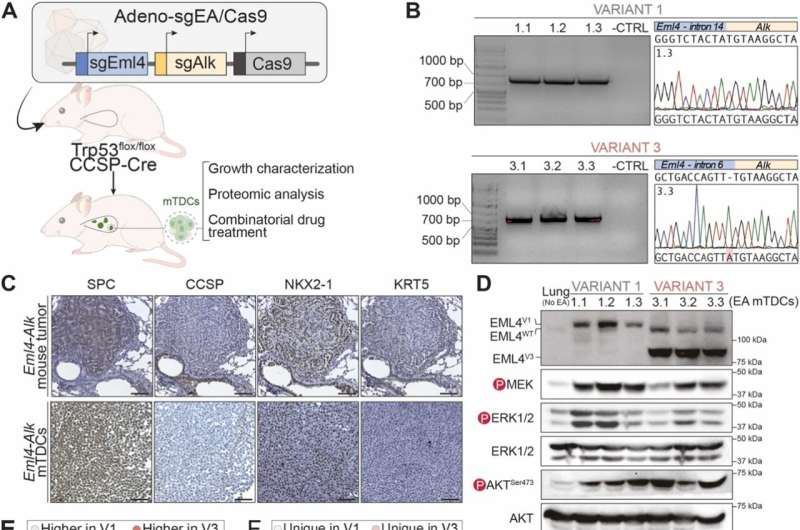This article has been reviewed according to Science X's editorial process and policies. Editors have highlighted the following attributes while ensuring the content's credibility:
fact-checked
trusted source
proofread
Combination therapy can delay resistance of lung cancer cells

A specific genetic alteration, known as an ALK fusion, drives non-small cell lung cancer in some patients. This abnormality leads to excessive activity of the ALK protein, a key cancer promoter. These tumors can be treated with an ALK inhibitor—but the cancer cells quickly develop resistance to the drug.
Scientists at the German Cancer Research Center have now shown in murine and human tumor cells that simultaneous treatment with ALK and SRC inhibitors improves the therapy response of the cancer cells and delays the development of resistance. The combination therapy, which strongly interferes with the protein composition of cancer cells, could improve clinical outcomes in the treatment of certain forms of non-small cell lung cancer.
The work is published in the journal Drug Resistance Updates.
In the genome of "non-small cell lung cancer," abbreviated NSCLC, the most common malignant tumor of the lung, researchers often find specific cancer-driving mutations. One of the frequent mutations, known as EML4-ALK, is caused by an incorrectly repaired break in the DNA strand that links the ALK gene directly to the EML4 gene. As a result, the cell produces large quantities of the constantly activated cancer-promoting kinase ALK.
In these cases, inhibitors against ALK can stop cancer growth. Unfortunately, the tumor cells quickly become resistant to the drugs. The sustained selective pressure of the drug leads to resistance-promoting changes in the ALK protein itself, but also changes in other cell signaling pathways can lead to insensitivity to ALK inhibitors. New treatment options that circumvent this resistance are therefore urgently needed.
"Not all EML4-ALK fusions are identical. They differ depending on the proportion of the fused EML4 gene," explains Rocio Sotillo from the DKFZ. The scientist suspects that the variants also respond differently to ALK inhibitors. The EML4-ALK variant 1 and variant 3 are the most common in human lung tumors. In their current work, Sotillo and her team have now examined mouse tumor cells carrying these two mutation variants.
Variant 3 in particular responded poorly to ALK inhibitors. After treatment with the drug, the researchers observed numerous changes in the proteome of the cancer cells. It was striking that the resistant cancer cells had strongly increased the kinase SRC. The scientists interpreted this as an indication that SRC could play a decisive role in the development of resistance.
The researchers then treated EML4-ALK variant 3 cells simultaneously with an ALK and a SRC inhibitor, which is also already approved as a drug. While monotherapy with one of the two inhibitors did not show significant inhibition, the combination treatment led to a strong synergistic effect. It caused a significant increase in programmed cell death and a reduced proliferation capacity of the cancer cells.
This also applied to lung cancer cells from patients carrying the EML4-ALK fusion protein. Four patient cell lines that were resistant to ALK inhibitors responded well to the combination therapy. After the treatment ended, there was little to no regrowth of the tumor cells.
A closer examination of the cell proteome showed that the combination therapy can block the expression of several proteins that are upregulated in resistant cells, including protein components of the important cancer-driving mTOR signaling pathway.
"The combination of SRC and ALK inhibitors improves the treatment response of lung cancer and at the same time delays the emergence of resistance," summarizes the study leader Rocio Sotillo.
Together with the observation that the combination therapy suppresses the cancer-promoting mTOR signaling pathway, these potent antitumor effects are an argument for further testing the combination therapy, possibly even for first-line therapy.
More information: Alberto Diaz-Jimenez et al, Concurrent inhibition of ALK and SRC kinases disrupts the ALK lung tumor cell proteome, Drug Resistance Updates (2024). DOI: 10.1016/j.drup.2024.101081


















